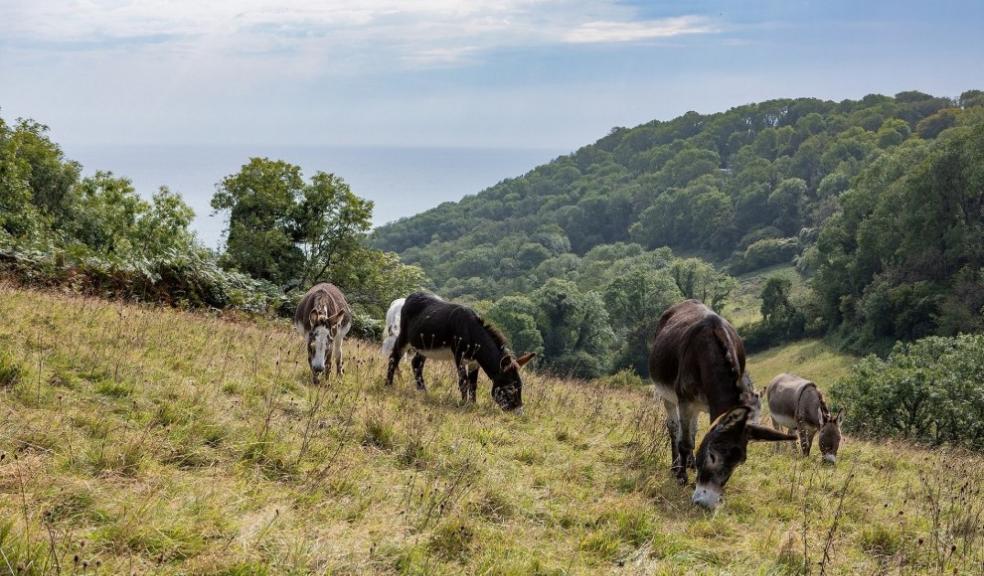
Donkeys could help in reintroduction of rare wildflower
Donkeys could play a role in an innovative conservation scheme to reintroduce one of the UK's rarest farmland wildflowers.
More than 20,000 seeds of the small-flowered catchfly have been sown in plots on farmland at the Devon headquarters of international animal welfare charity, The Donkey Sanctuary.
It is hoped that the plant will establish and thrive at the sanctuary. The small-flowered catchfly seed was sown alongside other wildflowers and grains, which provide food for threatened farmland birds such as the skylark, yellowhammer and linnet, which have been recorded on site.
The seed sowing is part of a strategy to reintroduce small-flowered catchfly to its former range and is part of environment charity Plantlife's Colour in the Margins project which aims to support rare arable plants across the country.
Colour in the Margins falls under the wider Back from the Brink programme, made possible thanks to the National Lottery Heritage Fund, which aims to save 20 species from extinction and benefit more than 200 more through 19 projects that span England.
If small-flowered catchfly becomes established The Donkey Sanctuary will consider holding a trial next spring to find out if donkeys can help the germination process.
If conditions are considered suitable, donkeys will walk over specially seeded plots, in a process known as treading in.
The animals' footfall may help embed the seed into the ground, potentially helping to boost the chance of successful germination of the wildflower.
The endangered small-flowered catchfly boasts pinkish-white leaves and is covered in sticky hairs, and it is these hairs that are behind its 'catch fly' name.
The plant has vanished from around 70% of its former range, virtually disappearing from northern England by 1950 as a result of agricultural intensification and an increased use of herbicide.
Small-flowered catchfly favours field margins and is now restricted to a number of sites near the coasts of south-west England and Wales.
The wildflower has been reintroduced at a number of sites in Cornwall and Devon as part of the project.
Ruth Angell, The Donkey Sanctuary Ecology and Conservation Manager said: "We are really excited about our involvement with the Colour in the Margins project. It is a great example of making best use of available land and finding ways to support a wider range of wildlife species.
"Increasing biodiversity is essential for an enriched and resilient environment which can support rare species as well as our resident herds of donkeys."
"It is important to us that our donkeys benefit from different types of activities and experiences. Our donkeys will be able to enjoy a walk with our grooms and benefit from one-to-one time while they walk over the plots.
"As well as allowing us to help with this exciting reintroduction programme to see the return of these rare arable plants, our wildflower and grain plots provide a rich nectar and pollen source for invertebrates, as well as seed and insect food for finches and buntings.
"Our team of conservation officers and volunteers work on a range of projects across our sanctuary sites, including woodland, hedge and grassland management to improve habitat for both wildlife and donkeys."
Cath Shellswell, Plantlife manager for the Colour in the Margins project, said: "We're incredibly grateful to partners like The Donkey Sanctuary who are helping these fantastically rare wildflowers come back from the brink of extinction by giving them a helping hand in one of their original regional strongholds.
"We look forward to seeing Small-flowered catchfly return and working with the sanctuary to ensure this tiny plant has a thriving future."
James Harding-Morris, Communications Manager for Back from the Brink, said: "Back from the Brink is all about working in partnership to save endangered species and so it is wonderful to see our Plantlife-led Colour in the Margins project and The Donkey Sanctuary working together to make a big difference for the small-flowered catchfly. It shows how every organisation and every individual has the power to make a positive change for our threatened wildlife."
The Donkey Sanctuary is a global leader for equine welfare, research and veterinary care. The charity operates programmes worldwide for animals working in agriculture, industry and transportation.












